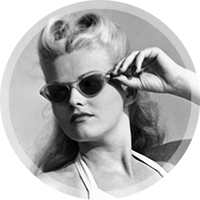

I would say that an appreciation for baseball is something I inherited, but for the fact that it wasn’t that conscious of a gift. It was more of an absorption, something I took in from the world around me without decision or thought, something I made a part of me because it was there. It was in the hours I spent at stadiums with pencil in hand, carefully marking strikes and hits and runs in the boxes on the scorecard. It was in the blue glow of the television in the corner, switched to the afternoon’s or evening’s game by default. It was in the announcer’s voice on the radio, flung south from Cleveland, reaching out through the open pickup truck windows into the warm summer air as we bounced over gravel roads through cornfields pink with the late setting sun. I never wondered at it. Baseball was as natural as the seasons, coming around one year and back the next and ahead into the future as far as we could see.
There’s an undeniable cultural romance in baseball, rare and enduring. It’s an amiable icon for so much of American life, a familiar enough fixture to be an useful metaphorical tool. It’s a backdrop for tales of success and tragedy and family. It moves slowly and creates space. It gives time and room to think. It incorporates quiet. All of this makes uniquely suited to myth making, which is why we’ve so successfully made it into one of our primary mythologies.
As an adult, I realized it was also a personal mythology. Growing up the lone girl in a family otherwise male, I spent time with a lot of sports—but baseball is really the only one that ever stuck with me even nominally. It’s a sport that rewards the observer in quiet, delayed ways. Without realizing it until many years later, I learned important lessons from baseball. I learned the value of patience. I learned the value of strategy. I learned the value in playing the long game, and being prepared for how quickly things could change, one way or another. I learned how to pay attention—when I was young and awkward, keeping score was the best way to feel I purposefully belonged in the crowd. In adulthood, I noticed I had enough confidence to settle back and sink into the game itself, but still keenly aware of everything that was happening.
Of course, the most important thing I learned from baseball is tied to the place in which I learned it: Cleveland baseball is how I learned to identify with the underdog. That’s a thread that runs through all Cleveland sports teams’ identities, and that of the city itself, and that of entire Midwest, and maybe the entire country as well—but its distilled essence was imparted to me via baseball. I took in the traditions and superstitions and history without question. I knew about Rocky Colavito and his lingering curse, which had kept the team away from a World Series win for decades. I knew about Louis Sockalexis, the first Native American Major League player, in whose “honor,” the team was supposedly named, and I needed many years of maturity and distance to understand how desperately poor that justification for casual racism really was—but I retained my appreciation of his achievement. I watched Major League more times than I could possibly count, even though its outdated social consciousness is a bit too much for me to enjoy now. (Bob Uecker, however, remains timeless.) The unified story that rises from these story pieces is simple: the deck is always stacked against us but we work hard anyway and that’s who we are and that’s the reason why, someday, we’ll win.
But we never really get to that someday. At least, we better hope we don’t. Because then what will we do? What would we strive for? What would we take pride in? What do would complain about? Winners so easily forget the depth of struggle and worth of hard work it took to get there. They become just like the other people who started out on top and lord knows we don’t have any use for those kind of people. If we were to forget how we got there, we’d betray everything by which we defined ourselves. But, still, we want to win. Because that’s what gives form to what we are. And that’s the story.
When I first moved to Chicago and settled a stone’s throw from Wrigley Field, more than one person warned me about the inherent pain in following the Cubs, a baseball team whose losing curse (this time bestowed by a rejected goat) had lasted even longer than Cleveland’s. But it was bewildering warning, because I already knew that story well. There was nothing scary or intimidating in it. I’d been told it over and over again in a hundred different ways, and I had learned a long time ago to tell it to myself in the example of my life. To me, that’s what baseball essentially is.
Now, on warm summer evenings, I open not truck windows but apartment ones, and I listen not for a familiar announcer’s voice but the rising roar of the crowd and the lilting organ tunes at Wrigley Field, and hope for a win. That’s the way the game is played, and always will be.